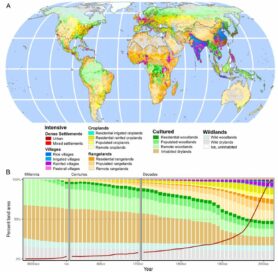Homepage
Welcome to the Copernicus Land Change Lab. We study the changes in land use and land cover and the consequences for climate, food, and biodiversity in the past, present and future.
Explore the HYDE data in an interactive manner, select one or more countries, or one or more indicators, create graphs and maps on the fly and download the accompanying data in one go: hyde-portal.geo.uu.nl
With an ever-growing world population, counting more than 8.2 billion people in 2025, the pressure on land increases rapidly. Land is used for e.g. agriculture and forestry to provide food, feed, fibre and timber; for urban areas to house people and industry; for infrastructure, for recreation and for conservation. In (recent) history, land use and land cover has changed dramatically: e.g. agricultural land has expanded, urban areas have grown, and deforestation has increased. Given the increasing pressure on land, these land use and land cover changes are expected to continue in the coming decades, thereby contributing to global environmental change. For example, large-scale land use and land cover change impacts the carbon and hydrological cycle, thereby influencing climate change, which in turn has large impacts on the socio-ecological system.
 Historical development of anthropogenic biomes (anthromes), based on HYDE land change.
Historical development of anthropogenic biomes (anthromes), based on HYDE land change.
But there are also significant environmental and socio-economic effects of land change such as erosion, degradation, biodiversity loss, impacts on water availability and quality, local food security and migration, which contribute to global change. Therefore, land change (land use and land cover change) plays a key role in sustainable development. i.e. many of the Sustainable Development Goals (SDG) of the UN are directly or indirectly related to land change (directly e.g.: Zero Hunger, Climate Action, Life on Land; and indirectly: almost all of them), which are at the core of research and teaching within Copernicus.
The Land Change Lab is led by Assistant Professor Kees Klein Goldewijk, and hosted at the Copernicus Institute of Sustainable Development.

